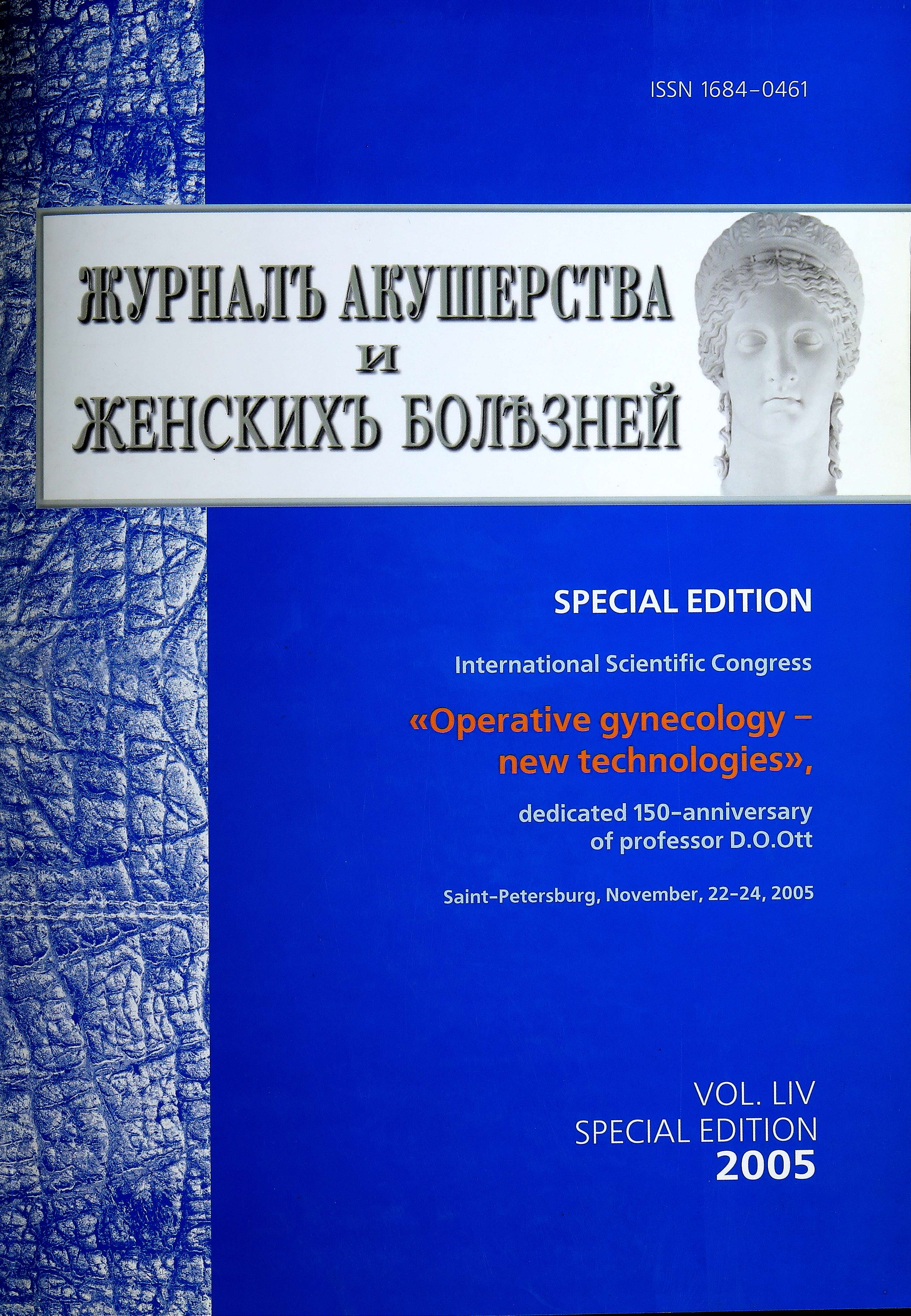Laparoscopy in diagnostics and treatment of hormonal infertility
- Authors: Rulev V.V.1, Abashova Е.I.1, Mischarina Е.V.1, Poteen V.V.1, Tarasova М.А.1
-
Affiliations:
- The Ott Institute of Obstetrics and Gynaecology of Russian Academy of Medical Science
- Issue: Vol 54, No 5S (2005)
- Pages: 29-30
- Section: Reviews
- Submitted: 15.11.2005
- Accepted: 06.11.2021
- Published: 15.11.2005
- URL: https://journals.eco-vector.com/jowd/article/view/87203
- DOI: https://doi.org/10.17816/JOWD87203
- ID: 87203
Cite item
Abstract
Introduction. In Russia the frequency of fruitless marriages exceeds the established WHO 15% critical level and reaches 17% from total of married couples.
Full Text
Introduction. In Russia the frequency of fruitless marriages exceeds the established WHO 15% critical level and reaches 17% from total of married couples. Since 1992 the negative yearly accretion of population in Russia is equal of 1,3%. Among the reasons of infertility the female infertility caused by hormonal insufficiency of ovaries occurs in 35-40% of cases. Hormonal infertility is consequence of various diseases of reproductive system and the common element of these diseases is an ovarian insufficiency. Earlier it has been established by us, that normogonadotropic anovulation, as a rule, is not connected with damage of the positive feedback mechanism between ovaries and a hypophysis and it is caused by insufficient secretion of estrogens by a dominant follicle. Finding-out and elimination of ovarian and extragonadal factors leading infringed folliculogenesis in ovaries, have great value for overcoming of hormonal ovarian insufficiency.
Material and methods. For 10 years the laparoscopy was performed in 1423 women of reproductive age with normogonadotropic ovarian insufficiency. Primary infertility took place in 43,4%, secondary - in 56,6% of patients. Duration of infertility varied from one year till 15 years.
Results. Besides hormonal inspection histological, ultrasonic, immunologic methods of research were used. Minor forms of extra genital endometriosis have been found out in 53,1%, extra genital endometriosis of III - IY stages - at 15,8%, chronic adnexitis - at 22,0%, polycystic ovary syndrome - at 9,1% of patients. Autoimmune oophoritis has been diagnosed at 30,1% of patients by means of a method of a straight-line immunnofluorescence. At 45,5% of patients the reason normogonadotropic ovarian insufficiency has been established for the first time. Laparoscopic electrocoagulation of endometrioidal heterotopies has led to restoration of ovulatory menstrual cycle at 34,3% of patients with an extragenital endometriosis. Electrocauterisation of ovaries has promoted the restoration of ovulatory menstrual cycle at 54,9% of patients with a polycystic ovary syndrome. In other cases the laparoscopy has helped to choose the optimal therapy of normogonadotropic ovarian insufficiency.
Conclusions. Thus, the laparoscopy is the important part in diagnostics and therapy of hormonal infertility.
About the authors
V. V. Rulev
The Ott Institute of Obstetrics and Gynaecology of Russian Academy of Medical Science
Author for correspondence.
Email: info@eco-vector.com
Russian Federation, St.-Petersburg
Е. I. Abashova
The Ott Institute of Obstetrics and Gynaecology of Russian Academy of Medical Science
Email: info@eco-vector.com
Russian Federation, St.-Petersburg
Е. V. Mischarina
The Ott Institute of Obstetrics and Gynaecology of Russian Academy of Medical Science
Email: info@eco-vector.com
Russian Federation, St.-Petersburg
V. V. Poteen
The Ott Institute of Obstetrics and Gynaecology of Russian Academy of Medical Science
Email: info@eco-vector.com
Russian Federation, St.-Petersburg
М. А. Tarasova
The Ott Institute of Obstetrics and Gynaecology of Russian Academy of Medical Science
Email: info@eco-vector.com
Russian Federation, St.-Petersburg
References
Supplementary files







